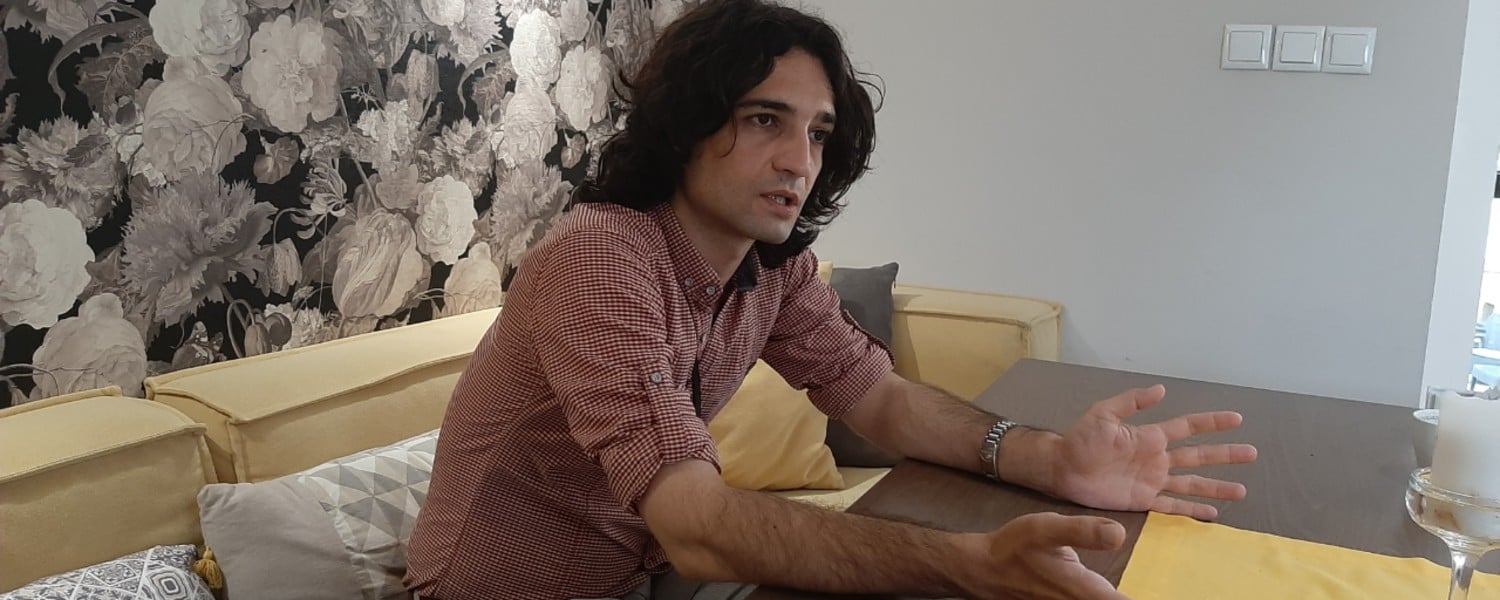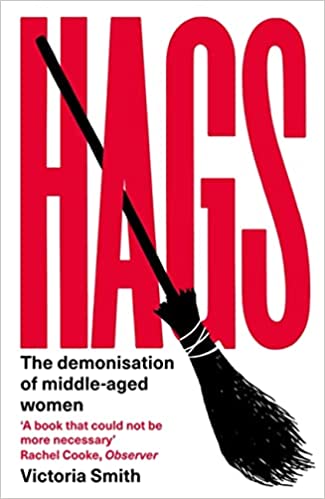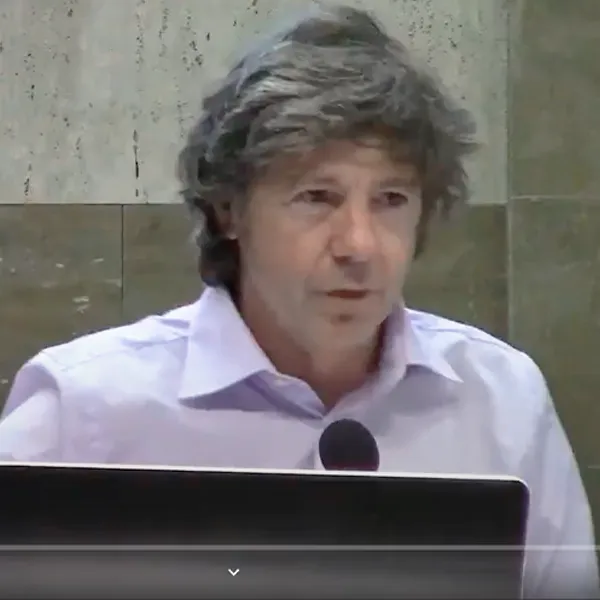Farid Ghadami is an Iranian professor of mechanical engineering as well as a prolific writer and translator. He has written fiction books, books of literary criticism, science manuals and has translated a number of English-language novels and writers. He is the first translator of a large number of Beat generation books into Farsi.
Farid Ghadami spent August 2019 in Sofia, Bulgaria as part of Next Page Foundation’s residency program. One of the events in his programme took place on 14 August in the Austrian Library in Rousse, where he presented his Farsi translation of the Bulgarian leftist poet Nicola Vaptsarov and discussed with the public his vision of “writing as translation” and “literary communism”.
Farid Ghadami gave an interview with the Barricade where he spoke about his realisations related to Bulgarian literature, about literary theory and practice in Iran, and about the state of the left in the Islamic Republic.
You chose Vaptsarov as your first Farsi translation of Bulgarian literature. How did you find out about him? How did you decide to translate his works? What were your first steps with Bulgarian literature?
It was almost accidental. I was translating a poem by Mayakovsky, called “Lenin”. As I was reading about Mayakovsky, I came upon the name of Vaptsarov. It was a completely unknown name to me. Then I searched for him on Google. Fortunately, I found a complete English translation of his poems. Most of them were translated by Peter Tempest. When I read them, they were impressive to me.
The first thing that struck me was his intensity and his idea of progress. Also, he saw human beings as animals with a close relationship to nature. It was so interesting, that the very night I read the poems, I decided to translate them.
When I started translating, I started reading about Bulgarian literature. I found the site “Contemporary Bulgarian Writers”, which became very useful to me. It offered a lot of information. I started to read other Bulgarian literary works. I found them good and completely new to me.
I thought that the most important thing you can understand in Bulgarian literature is its intensity. It is very rare in our world. That is why I decided to translate some Bulgarian writers.
You are a mechanical engineering university professor. Vaptsarov’s poetry book is called “Motor Songs”. What are the commonalities between him and you?
As I was sitting in the engineering university, I was impressed by Vaptsarov’s attitude towards technology and progress. As somebody who has graduated from the engineering discipline, I had a better understanding of what technology can do in our world. Technology is always a new power. If you don’t know enough about technology and engineering, it is possible that you will fall into sentimentalism and fundamentalist romanticism.
Isn’t Vaptrasarov not only a technocrat but also an idealist? How close is Vaptsarov to you from the standpoint of idealism about life?
In the human sense, he is an idealist. He was an optimist about life – just like me. Both of us are materialists. I feel a lot of similarities between us. I think Vaptsarov was very smart, because it wasn’t easy to think in his way in the first half of the 20th century. He believed if you are a fellow of workers, you can’t be an anti-technology man. You also cannot be anti-nature, you can’t refer to nature as a slave. There is a theory by Theodor Adorno that if you can overcome nature, after that you will overcome the people. When you turn nature into a slave, then other people will become slaves to you.
If you have a factory, they will work for you as slaves. There have been workers as slaves for the last three centuries. In this moment there are a lot of slaves in the best factories in the world, in countries that claim to be democratic.
Here in Rousse, you said that you have plans for further translations of Bulgarian literature into Farsi. Could you tell us more about your plans with regards to Bulgarian literature?
Right now, I am working on an anthology of contemporary Bulgarian writers and its publication in Farsi in Iran. Among these writers are Zdravka Evtimova, Alek Popov, Velina Minkoff, Olya Stoyanova and others. As a translator, I want to translate at least two books of Bulgarian literature per year. My next project will be “Nine Rabbits” by Virginia Zaharieva and “Le Grand Leader Vient Nous Voir” by Velina Minkoff. After that, I will decide what else to translate.
As I writer, I have a lifetime project to write about cities in the world. These days I am working on an autobiographical novel about my experience in Sofia. I have a suggestion from the head of Elias Canetti Society, professor Penka Angelova, that they are inclined to publish my book on the theory of literature. So I am going to translate this book “Policies of Literature” into English and then have it translated into Bulgarian.
I will continue my cooperation with Next Page Foundation. I want to thank them and especially Yana Genova for inviting me to Bulgaria as a translator and writer in residence. It is a wonderful first step, which I passed. I hope that in the coming months we will have a lot of work with each other.
You have a book on the theory of literature and you have a vision, called “literary communism”. What do you mean by “literary communism”? Is this some kind of utopia? How does it make the world better?
It is a term coined by Maurice Blanchot, but unfortunately he couldn’t explain it further. I found this term very useful as it relates to my theory of ‘writing as translating’. I use this term “literary communism” and give examples of this term in literature, such as in the words of Walt Whitman, James Joyce and Henry Miller.
As far as I understand you see literature as a way of connecting people across borders. Is this what you understand as “literary communism”?
It is a little more complicated. In writing as translating, my theory is that the writer must approach the subject of his writing from several angles and in each angle is one language – English, Persian, Bulgarian, etc. As the author approaches his subject of writing, he gathers multiple languages in one subject. And that is how all the differences we have between our cultures can be overcome.
Any one of us can read a book. Books do not discriminate against their readers. So I believe in improving society through books, through literary communism. Our politics must be inspired by literature, by the imaginary. Literary communism is a methodology to understand literature. In this sense, we can understand Rumi who uses in one poem Persian, Turkish, Arabic and Greek. In a similar way, in Whitman’s poem all the people of the world are united by a road, leaving everything else behind – religion, gender, nationality. For Whitman, life is a road. You must travel and leave everything behind before it becomes rigid and starts to restrain you. Roads are very important for Whitman, because they connect people to each other. So Whitman has a lot of praise for technology, which built railroads and the Suez Channel, which joined people.
You have many followers on Iranian social media so you are a kind of influencer. And you also believe in and see how literature changes society. How do you manage to make this change? Is Iran a special country where literature matters?
Most people in the world want to know things, but unfortunately the things they want to know about are bullshit. A lot of people read Harry Potter and bla bla. They have time to read, they are interested in reading, but unfortunately they are impressed by the media and its homogenous culture. In my theory, this culture consists of pop, porn, and popcorn, an unholy trinity. In order to create change in our society, we must encourage people to read real literature. We can make big changes through real literature.
In Bulgaria, influencers on social media are businessmen, motivational speakers and vloggers. You don’t have writers or theorists of literature who are influencers. Is Iran a special country, where intellectuals are influencers?
I would be glad if this were true. But I think that if all the intellectuals in the world want to make change, they have to attract readers. Our world is not like the 14th century, where there was no media, and people could only read books. In our world, there are two problems:
- Global media plants in people’s minds the fake idea that they already know everything. It is affirmed that any belief is respectable. But why should it be like that? Because challenging people’s points of view has been eliminated.
- Most people are inspired by movie stars, pop singers, football players and CEOs. These are people who don’t think or worry about ordinary people. It doesn’t matter to them if one day a country’s government decides to kill all of its people. Nobody in this community of movie stars and pop singers worries about this and does nothing to stop it. They only think of people as sources of money.
But ordinary people who aren’t well-educated think, unfortunately, that these stars are their role models, that it is easy to reach this level. They don’t have any talent or high level education. They are ordinary people.
Kim Kardashian is a big star, but who is she? Just nothing. It is easy for people, especially for people in the working class and middle classes to imagine: “I am nothing like Kim Kardashian. So she can be a model for me. All of us are nothing. But I am poor and she is rich.”
Kim is promoted by the global l media. It is promoted that the most important thing is making money.
We were speaking about influencers in Iran who are also people of literature such as yourself…
I want to reach this point. As intellectuals we have to find a way to impress people. People are different in each country. In Iran, it is not easy to impress the people. First, you must have their trust. Your readers must trust that you care about them and that you have new things to tell them so that you can change their life.
It is not a sudden occurrence. It is a gradual process that people find you as a writer, an intellectual, and that you are worried about them. And you can have a good impact on their way of life. I would be very glad if I have this thing in Iran after 15 years of writing and translating, I’m not sure of course.
What struggles have you had to overcome to become such a prolific writer in Iran?
I started to write when I was 10 or 11 years old. My first poetry book was published when I was 17 years old. At that time I started to translate. I first translated the poem “The Rock” by T.S.Eliot. But this translation was not published. My second translation was “Under Siege” by Mahmood Darwish – first in a magazine, then in a book. My critical papers were first published 20 years ago, when I was 14 or 15 years old.
I have travelled a long way to reach this point. My education was in mechanical engineering. My career as a writer has been mixed in with my career as a translator.
You have translated more than 30 books…
I have published four novels, one poetry book, three books of criticism and four books in science: mathematics, English for engineers, and methodology of research. More than thirty books were published translations. Among them I have translated Jack Kerouac, Alan Ginsberg, William Burroughs, Walt Whitman, Mahmood Darwish, Arthur Rimbaud, etc. Many of them were translated for the first time into Farsi by me.
It is interesting how the Beat generation and its ideals are perceived in Iran. What are the reactions to your translations?
My first translation of a Beat novel was “The Dharma Bums” by Jack Kerouac. The book was strongly welcomed by people. One thousand copies of the book were sold in one week. My publisher had to reprint it. Beat culture is very popular in Iran. Young people saw in them a new idea for living. When you read Kerouac, Burroughs, Ginsberg you can find new ideas for thinking in a new way. It is not hard to understand them.
Maybe somebody can search for new things in Agamben, Benjamin, Hegel, but they are not easy to read for anybody in the world. When you are a teenager or an ordinary worker, you can’t read Wittgenstein. But you can read Kerouac or Burroughs. They create your life out of this mad ideological world we live in.
How is Bulgarian literature perceived in Iran and what is Iranian interest in Bulgarian culture?
Bulgarian literature is something new for the Iranian reader. Fortunately, the Iranian reader trusts me when I introduce something new to them
What do you mean by intensity, when you say Bulgarian literature is intense?
It is a term from Deleuze. When you read something in extremities, this is intensity. Our world is very mild. Light cigarettes, decaffeinated coffees. Even in the case of the weather, people prefer to visit mild regions. In the summer they prefer colder regions and in the winter they prefer warmer countries. They seek out mild things. But Bulgarian literature is going to hot countries in the summer and going to cold countries in the winter. Literature is on the border of our experiences in the world. When you have some desire as a writer, your writing will be intensive. I think Bulgarian literature is intensive, because of this way of finding and expressing things. You know that Virginia Zaharieva’s poetry infuses everything with an intensity of emotions – like broken glass. This book for me is like broken glass, which you can touch. Parts are sharp and dangerous. It is not easy to read these poems. In the beginning it is difficult to understand it.
In other Bulgarian literature I have felt intensity.
You use terms such as literary communism and you are very familiar with European leftist thinkers. What kind of left exists in Iran? What does it mean to be left-wing in Iran?
Most of Iranian intellectuals are left-wing – not only today, but also in the past. These are Sadegh Hedayat, Nima Yooshij, Houshang Golshiri, Gholam Hossein Saedi, Ahmad Shamlou. All of them are leftists, because they are seeking justice, freedom and anything that is related to the left. But during the last few decades there have emerged three branches of the left. One of them is orthodox – Marxist-Leninist. They are not very welcomed by the readers, because many people find them old-fashioned. Maybe their talks and writings are not accepted as something that can happen. What they write is not useful or applicable.
Another branch is new leftists. They are inspired by Alain Badiou, Giorgio Agamben, Slavoj Zizek, Walter Benjamin, Theodor W. Adorno, Herbert Marcuse, and Max Horkheimer. I call them western leftists. They are very welcomed by the Iranian young people. The biggest portion of books which are published in Iran are from new leftists.
The third branch is something like anarcho-leftists. They are inspired at the same time by Karl Marx, the Beat Generation, Bakunin, Alain Badiou, even Lenin. But they are not very focused on the concepts of economy and politics. They prefer to work on individual matters, on individual freedom, not progress in politics, but progress in the form of life, in culture. They are something like the Beat Generation in the United States. They are leftists, but don’t have a political party and without the goal of gaining power. They want to impress people through the culture.
To what extent is the Iranian left, in its various forms, only an intellectual effort and to what extent does it have practical application?
Unfortunately, we don’t have a leftist party or a big organisation. In the presidential elections and in the previous elections many people, maybe half of the leftists voted for Hassan Rouhani as a conservative man, not as a leftist or even a liberal man. It happened because most intellectuals decided to encourage people to vote for him. Of course, some leftists preferred to encourage people not to vote.
In the times of Ahmadinejad, there were a lot of sanctions as a reaction to his policies. There was also the oppression of women in Iran. Rouhani was not the best but we preferred to vote for him, because we didn’t have another candidate, to prevent war between Iran and America and to establish good relations with Europe. We were right, because Rouhani’s government managed to sign a very good deal with the US and European countries, but unfortunately as soon as a madman such as Trump became president, the entire deal was blown away. There is nothing in this deal now. There is nothing for Iran in it now. Today the world is completely Americanised in politics, economy, culture. When the US refuses its commitments in a deal and wants to take sanctions against any bank, any agreement with Europe cannot work. It is only a piece of paper at this point. It is not a real deal.
Anyway, that is the way intellectual people play a role in Iranian society. We invite people to do or not to do some action.
Are there social movements in Iran which consider themselves to the left?
Yes. There are labour unions in Iran, but unfortunately most of them are not connected to the intellectuals. Because of this gap, the workers in the syndicates only ask for salary increases and something like it. They don’t know much about privatization, economic surplus, rent , capitalism and so on. In the last few decades, because of sanctions and the collapse of the economy, many workers have worked for example for 5-10 months without any salary. It is because their bosses refused to pay them.
But all that those workers wanted was for their salaries to be paid. Nothing more. But maybe in two or three years I feel a bigger connection is going to be formed between workers and intellectuals. I hope it will happen, because it is very good for intellectuals to be involved in real actions. It will be useful for workers to have ideas and aims, about their role in society and country, and what they can do for the economy as an overall structure, not only in factories.
What about the Iranian feminist movement? To what extent do Iranian women participate in the left political current in Iran? What are the demands and the accomplishments of the feminist movement in Iran?
I think Iranian civil society is a feminine society today, and the role of women in all social, artistic and political fields can be clearly seen. Throughout contemporary Iranian history, women have always been discriminated against. If a male worker is discriminated against, a female worker will experience it double. They are more courageous and more practical because of this double discrimination. I think women in Iran are the real leaders of all the social and cultural developments.
Can you draw a picture of Iranian society under sanctions? What problems have appeared?
There are a lot of problems. For example, Americans say that they don’t impose sanctions on pharmaceutical drugs. But Iran depends on foreign products to cure cancer. The government can’t buy these drugs, because they don’t have foreign currency. They can’t pay or be paid. No trade can happen. There are more than 100,000 people in Iran who need drugs immediately. These drugs must be imported to Iran. This is only one of the problems.
The second problem is that many factories have shut down, because they can’t buy the raw materials or machines from Europe and they can’t sell their products. Iranian people are getting poorer because of these conditions. They can’t sell to other countries, because of sanctions.
You know that 2021 there will be new presidential elections. Rouhani cannot run for a third term. What will be the answer of the Iranian left to both the sanctions and to these elections? Who will the left support?
If we have another election between these two established conservative parties, I think most of the left will encourage people not to vote for anybody, because there is no difference between them.
But how will change happen without voting?
We have to create social movements to change attitudes as well as politics and economics in Iran. In the last decade we have had two presidents from two different groups. First was Ahmadinejad, a conservative fundamentalist. The second was a conservative reformist, Rouhani. But there is almost no change in the economy. Our factories have stopped. Our economy has collapsed. And discrimination against women is on. Workers and the middle class are not in a good situation, while our country is very rich. Nothing has changed.
What is the positive vision for the left in Iran?
We have to be optimistic and act as intellectual activists. I think everything will be better in Iran as a country, and the whole world. Capitalism and the current order of the world has been nothing but thousands of deaths in stupid wars, millions of hungry, millions unemployed and environmental catastrophes. I am sure we will be happier and in better condition with more freedom and justice. We want it, we will fight for it and we will gain it. I am an optimist in this way.
Photo: Farid Ghadami (photo: Baricada)











